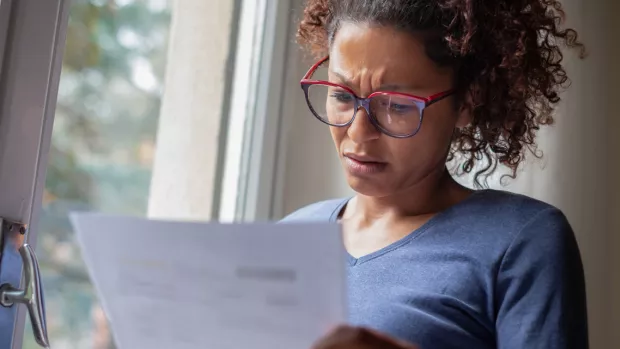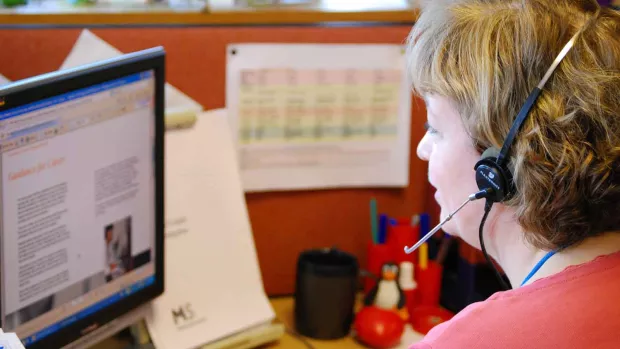
Other financial help
As well as disability benefits, read about other financial help you can get that might make living with MS easier.
As with benefits, some other sources of financial help may be means-tested. This means you're more likely to qualify for this help if you're on a low income. But even if you're not on a low income, there's help available to everyone with a disability.
In 2023, the UK Government will make several one-off payments to help with the increased cost of living.
Follow the links to find out about
- Saving on public transport
- Housing grants including Disabled Facilities Grant
- Help with energy bills
- Prescription charges
- Free period products
- Dealing with debt
- Cheaper broadband and TV
- Help from your local council
Save on public transport
In England free off-peak travel on all local buses is available to disabled people who qualify. Similar schemes operate in Wales. Application forms are available from local councils.
For information on cheaper travel in Scotland visit transport.gov.scot. You'll learn about the National Entitlement Card scheme that can let you travel for free. When you apply for this card, your neurologist can write the supporting letter you’ll need. Or an MS nurse can now do this too.
In Northern Ireland if you're disabled you can get half-fare bus and train travel with a Smartpass. Apply for cheaper travel in Northern Ireland at Translink.
If you've got MS, you're eligible for a Disabled Person’s Railcard. It could save you, and the person you're travelling with, a third off most rail fares throughout Great Britain. Find out more and apply at National Rail's Disabled Person's Railcard website. The website doesn't mention MS, but if you have MS you are eligible. You'll need to provide a letter from your hospital or neurologist confirming your MS diagnosis.
Housing grants including Disabled Facilities Grant
Disabled Facilities Grants are available in England, Wales and Northern Ireland. Scotland has its own scheme of housing grants, as part of the ‘scheme of assistance’ which also offers information and advice.
These are all grants made by local councils for disabled people to help pay for the cost of changes to their home. For example, to improve access with a ramp or widened doors, or to change the layout of a bathroom or kitchen.
They’re available if you rent or own your home.
If you apply, the council might send an occupational therapist to see what changes they think would be helpful to you. Don’t start any work before the council approves your application – it might affect the award of the grant.
To find out more and to apply, contact your local council.
Read more about the Scottish scheme of assistance at Citizens Advice
Help with energy bills
The costs of energy can quickly add up. Because of the sudden rise in the cost of living, in 2023 the UK Government will make one-off payments to help with the cost of living. There are also other schemes which can help with energy costs:
Energy Price Guarantee and the 'price cap'
The 'Energy Price Guarantee' runs until the end of June 2023. It's a 'price cap' set by the UK Government to keep energy prices lower.
From July 2023, the price in England, Wales and Scotland will be set by the energy watchdog Ofgem. They'll set it every 3 months.
There'll be no price cap in Northern Ireland, but prices are reviewed by the government, Consumer Council and the Utilities Regulator.
What the change means for bills
Energy in Great Britain will cost less between July and September 2023 than in June 2023. But the overall cost of your bill might not change a lot. That's because there won't be an extra government payment to help as there was with the Energy Price Guarantee.
In Northern Ireland, we don't know yet if there'll be a cost difference. But prices for the coming months will probably be announced in June.
How the price cap works
The price cap limits:
- the price per unit of energy you use at home
- the standing charges - the amount the company charges each day however much or little you use.
Prices can still rise, but not as much as they would without this help.
Read the UK Government information about the Energy Price Guarantee
Read about the Ofgem price cap on the Money Saving Expert website
Support available every year
There are other measures in place every year which could help.
If you get certain benefits, you may qualify for government Cold Weather Payments. You might get these if the temperature falls below freezing over seven days in a row. These payments are different from government Winter Fuel Payments which pensioners get.
For information on energy efficiency schemes to help with insulation, room heating and water heating, contact the Energy Saving Trust. In some parts of the UK there are government schemes to improve heating and energy efficiency:
- in Scotland there's the Warmer Homes Scotland scheme
- the Welsh Government runs the Warm Homes Nest scheme
- in Northern Ireland there's the Affordable Warmth grant scheme
If you're worried about fuel bills this winter and you're trying to save energy to cut costs, look into the Warm Home Discount Scheme. It offers grants towards fuel costs. If you're affected by MS, you can either contact your energy provider, or go to the government website and follow the instructions.
Check out this useful Gov.uk energy grants calculator to find out what support you might be eligible for.
For extra support, including practical support if there’s a power cut, you can sign up to the priority services register with your electricity and gas suppliers.
Find out how to get on the priority services register from the energy regulator Ofgem
If you have an energy debt
If you have an energy debt, you might be able to get a grant from the British Gas Energy Trust. They can give grants for energy costs to customers from any energy supplier in England, Wales or Scotland.
Before you apply, you’ll need to get money or debt advice, and check if your own supplier has a trust which can help.
Find out if you're eligible for British Gas Energy Trust grants
I can’t pay my energy bill
If you can’t afford to pay an energy bill, contact your supplier. They have to discuss ways to find a solution. If you don’t contact them they could threaten to move you onto a pre-pay meter or possibly even disconnect you.
The supplier has to consider:
- what you can afford
- how much energy you’ll use in the future
- the impact of your MS
Everyone with MS is covered by law that says the supplier has to make reasonable adjustments. For example, a pre-pay meter might not be an option if your MS means you couldn’t practically or safely have one.
Payment options include a payment plan (paying it off bit by bit) or the government’s Fuel Direct Scheme where you pay direct from certain benefits.
Citizens Advice has more about how to discuss things with your energy supplier:
Read Citizens Advice energy supplier advice in England
Read Citizens Advice energy supplier advice in Wales
Read Citizens Advice energy supplier advice in Scotland
Contact Advice NI for advice about paying for energy in Northern Ireland
I can’t top up my pre-pay meter
If you’re struggling to keep a pre-pay meter topped up, there are a few things to check:
- Can you get temporary credit for your meter? This might happen automatically to stop the supply cutting off. If it doesn’t, contact your provider.
- If your credit runs out, your supplier might extend it if you’re considered ‘vulnerable’. For example, that could be because of your health, your age or your financial situation. You’d need to agree how you’d pay back this extra credit.
- Are you getting all the benefits and support you’re entitled to? This might include fuel vouchers and energy grants. A benefits adviser can help you check. Get in touch with our MS Benefits Advice Service by calling our MS Helpline on 0808 800 8000 or emailing [email protected]
- If you've got a traditional prepayment meter (not a smart meter) you need to redeem the 6 fuel vouchers you should have been sent yourself. They all expire on 30 June 2023. Take them to a Post Office or a shop with PayPoint and you can add it to your energy top-up key or card. If you've got a smart meter, the same discount happens automatically. If you've not had all 6 vouchers, contact your supplier to let them know.
- If you’re paying back what you owe to your energy supplier, each time you top up the meter some of that goes to pay off what you owe. Let them know if you can’t afford what you’d agree to pay back, so you can agree a new payment plan.
- Should the supplier be changing it for normal meter instead? For example, they might have to do this if your MS means it’s hard for you to use a pre-pay meter, or it’d be bad for your health if the electricity or gas shuts off. If you’ve got MS, you’re entitled to reasonable adjustments like this under the law.
Citizens Advice has more about how to manage with a pre-pay meter:
Read Citizens Advice pre-pay meter information for England
Read Citizens Advice pre-pay meter information for Wales
Read Citizens Advice pre-pay meter information for Scotland
Contact Advice NI for advice about paying for energy in Northern Ireland
Prescription charges
Prescriptions are free in Northern Ireland, Scotland and Wales.
If you live in England, you may save money by buying a prescription pre-payment certificate (PPC) if you have to pay for more than three items in three months, or 11 items in 12 months.
You might also qualify for free prescriptions if you can't leave home without help, if you get certain benefits, have a low income or have certain conditions (such as epilepsy). You'll need an FP29A form from your doctor, hospital or pharmacist.
Find out more about prescription charges on the NHS Choices website
Free period products
You might be able to get free period products (like tampons, sanitary pads and menstrual cups). These could be available from:
- your local council
- schools and colleges (if you’re a pupil or student)
- food banks
- a hospital (while you’re having treatment there)
In Scotland, there’s an app to find your nearest provider.
Get the Pick Up My Period app from the Scottish Government website
Back to the top
Dealing with debt
For some people, however much they budget, the change in their circumstances is so great that they can't carry on paying for rent, mortgage, utility bills and so on.
If you're in serious debt, it's essential to get advice. If you live in England and Wales, GOV.UK's debt pages are very useful, including advice on what debts must be prioritised. If you live in Scotland visit Mygov.scot for information and advice. In Northern Ireland, Advice NI has debt advice.
The National Debtline provides advice for those in debt.
Independent financial advice
For further professional advice, you can look for an Independent Financial Adviser (IFA). Their services are often free, or they take a percentage of payment from a product provider (such as a building society which sells you a mortgage).
Your bank or building society may have a financial adviser attached to it, though they may be committed to selling you a product from their own range.
Cheaper broadband and TV
You might be able to save on your broadband internet access and on your TV licence.
Savings on broadband internet access
You might be able to get cheaper broadband if you get certain benefits, including Universal Credit. The UK Government says these ‘social tariffs’ will be available in 99% of the country. Contact your broadband supplier to see if they offer a social tariff.
Find social tariff broadband deals on the regulator Ofcom website
Cheaper or free TV licence
You can get a free TV licence if you’re 75 or over and you get Pension Credit (or your partner who you live with gets Pension Credit).
If you live in a residential care home you might be able to get a much cheaper licence. And the licence is half price if anyone in the household is registered blind.
Find out more and apply at the TV licensing website
Help from your local council
You might be able to get help directly from your local council. That's on top of any benefits you're entitled to. For example, they might help with emergency food or heating costs. Each UK nation has its own schemes and the support can vary between local councils.
Find out more about local council support in your nation from the Entitled To website
Last full review:
We also update when we know about important changes.




